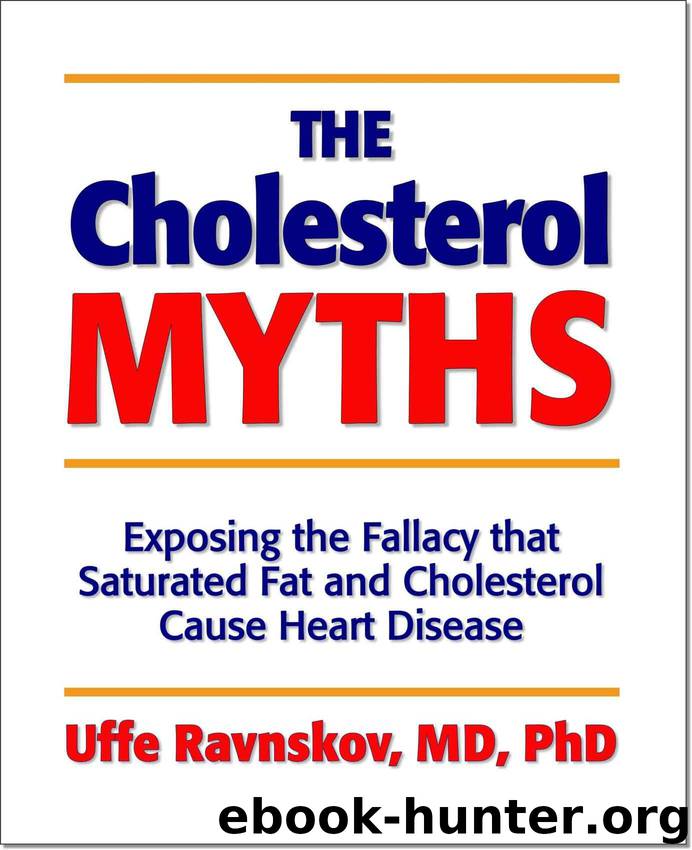The Cholesterol Myths: Exposing the Fallacy that Saturated Fat and Cholesterol Cause Heart Disease by Ravnskov Uffe

Author:Ravnskov, Uffe [Ravnskov, Uffe]
Language: eng
Format: azw3, epub
Tags: Health, Mind & Body
Published: 2016-04-28T04:00:00+00:00
Treatment Group Control Group
Number of individuals 59,514 53,251
Non-fatal heart attacks (percent) 2.8% 3.1%
Number of individuals 60,824 54,403
Fatal heart attacks (percent) 2.9% 2.9%
Number of individuals 60,456 53,958
Total number of deaths (percent) 6.1% 5.8%
As you see, the number of deaths from a heart attack was equal in the treatment and in the control groups, and the total number of deaths was greater in the treatment groups. In one study total mortality had decreased significantly, in two others it had increased significantly, and in no trial was coronary mortality changed more than could be attributed to chance. More sophisticated calculations did not change the picture.
There was a small reduction in the number of non-fatal heart attacks. Calculated in the way diet-heart supporters usually do the difference was 10.4 percent; calculated the simple way, the difference was 0.3 percent. Due to the large number of individuals studied this small difference was statistically significant, but most probably it was a result of bias. Not only were the trials open and partly multifactorial; there was another finding that definitely proved that cholesterol lowering does not make any benefit.
If cholesterol lowering could reduce the risk of coronary heart disease, a pronounced and prolonged lowering should of course lower the risk more than a slight and short one. But there was no relationship between the degree of cholesterol lowering and any of the end points, not between individuals in each trial and not between trials. And on average, total mortality was equal in short and long trials, and coronary mortality was higher in long trials than in short ones.
So, although some of the trials also included physical exercise, weight loss, reduction of blood pressure, and smoking advice, and although most trials were open, the number of non-fatal heart attacks was not reduced by more than 0.3 percent. And even if the doctors had been totally uninfluenced by their knowledge about the patients’ group affiliation, remember that what doctors—even experienced ones—call a heart attack very often is something else.
After its publication in the British Medical Journal, my meta-analysis provoked harsh comments from diet-heart supporters.[173] According to my critics, the most serious mistake was to include trials using hormones, since such drugs are now considered toxic to the heart. But in one of the first controlled trials published, conducted by Professor Jeremiah Stamler, the researchers used low doses of the female sex hormone estrogen and that trial had the best result of all. High doses of estrogen are possibly harmful for men, but whether low doses are harmful is an open question. In women, at least, low doses, such as those used in post-menopausal hormone replacement therapy, seem to protect against heart attacks.[174] The results were also just as unsupportive in the subgroup calculations, even in subgroups that did not include the hormone trials.
Another objection was that I had ignored the angiographic trials, because they “can lead to regression of atheroma,” as one of the critics noted. Let us therefore look at a more recent meta-analysis which included the angiographic trials.
Download
The Cholesterol Myths: Exposing the Fallacy that Saturated Fat and Cholesterol Cause Heart Disease by Ravnskov Uffe.epub
This site does not store any files on its server. We only index and link to content provided by other sites. Please contact the content providers to delete copyright contents if any and email us, we'll remove relevant links or contents immediately.
| Administration & Medicine Economics | Allied Health Professions |
| Basic Sciences | Dentistry |
| History | Medical Informatics |
| Medicine | Nursing |
| Pharmacology | Psychology |
| Research | Veterinary Medicine |
Periodization Training for Sports by Tudor Bompa(8253)
Why We Sleep: Unlocking the Power of Sleep and Dreams by Matthew Walker(6706)
Paper Towns by Green John(5179)
The Immortal Life of Henrietta Lacks by Rebecca Skloot(4576)
The Sports Rules Book by Human Kinetics(4379)
Dynamic Alignment Through Imagery by Eric Franklin(4208)
ACSM's Complete Guide to Fitness & Health by ACSM(4057)
Kaplan MCAT Organic Chemistry Review: Created for MCAT 2015 (Kaplan Test Prep) by Kaplan(4008)
Introduction to Kinesiology by Shirl J. Hoffman(3766)
Livewired by David Eagleman(3764)
The Death of the Heart by Elizabeth Bowen(3610)
The River of Consciousness by Oliver Sacks(3599)
Alchemy and Alchemists by C. J. S. Thompson(3515)
Bad Pharma by Ben Goldacre(3422)
Descartes' Error by Antonio Damasio(3270)
The Emperor of All Maladies: A Biography of Cancer by Siddhartha Mukherjee(3148)
The Gene: An Intimate History by Siddhartha Mukherjee(3094)
The Fate of Rome: Climate, Disease, and the End of an Empire (The Princeton History of the Ancient World) by Kyle Harper(3055)
Kaplan MCAT Behavioral Sciences Review: Created for MCAT 2015 (Kaplan Test Prep) by Kaplan(2984)
